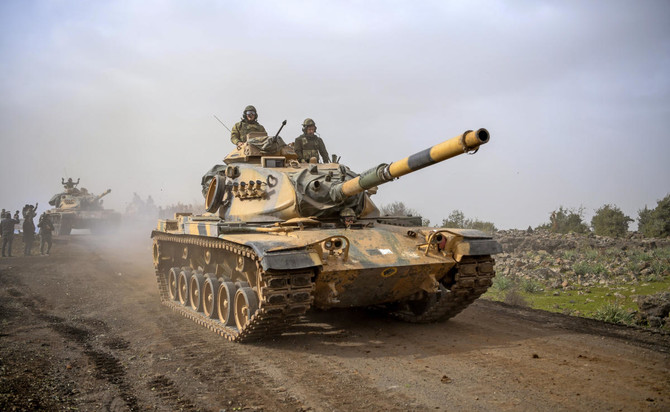Turkey is trying its best to clean up the mess created by some regional countries as well as international power brokers in Syria especially in northwestern Syria’s Afrin.
Although it still believes in zero interference interfering the domestic affairs of others countries, but in order to avoid severe repercussions of “Syrian Conflict” it started a full-fledged military operation code named “Olive Branch”. It was directed against Kurdish YPG in Afrin. There was hue and cry in the region as well as some European countries as usual showed baseless concerns about it but the Turkish operation is still going on and on and successfully copes with the menace of terrorism in the region most especially near its border.
Most recently, President Erdogan said that the Turkish military operation in Afrin is about to end, his statement comes after Turkish forces gained control of the strategic mount Darmak in the city of Afrin. Mount Darmak has strategic a very position and was used to bomb the border city of Kalis with missiles by the Kurdish protection forces. Turkey’s armed forces are still determined to fight against all odds to defeat Kurdish YPG in Afrin until there is no terrorist on its border leading to Iraq. More than 40 Turkish soldiers have so far been martyred in this Afrin.
According to Ankara hundreds of YPG fighters have been killed in the operation and now city of Afrin has been neutralized from YPG terrorists. Turkey says the YPG is an offshoot of the outlawed Kurdistan Workers’ Party (PKK) which has waged a three-decade insurgency against the Turkish state. Moreover, YPG has also been working closely with the United States.
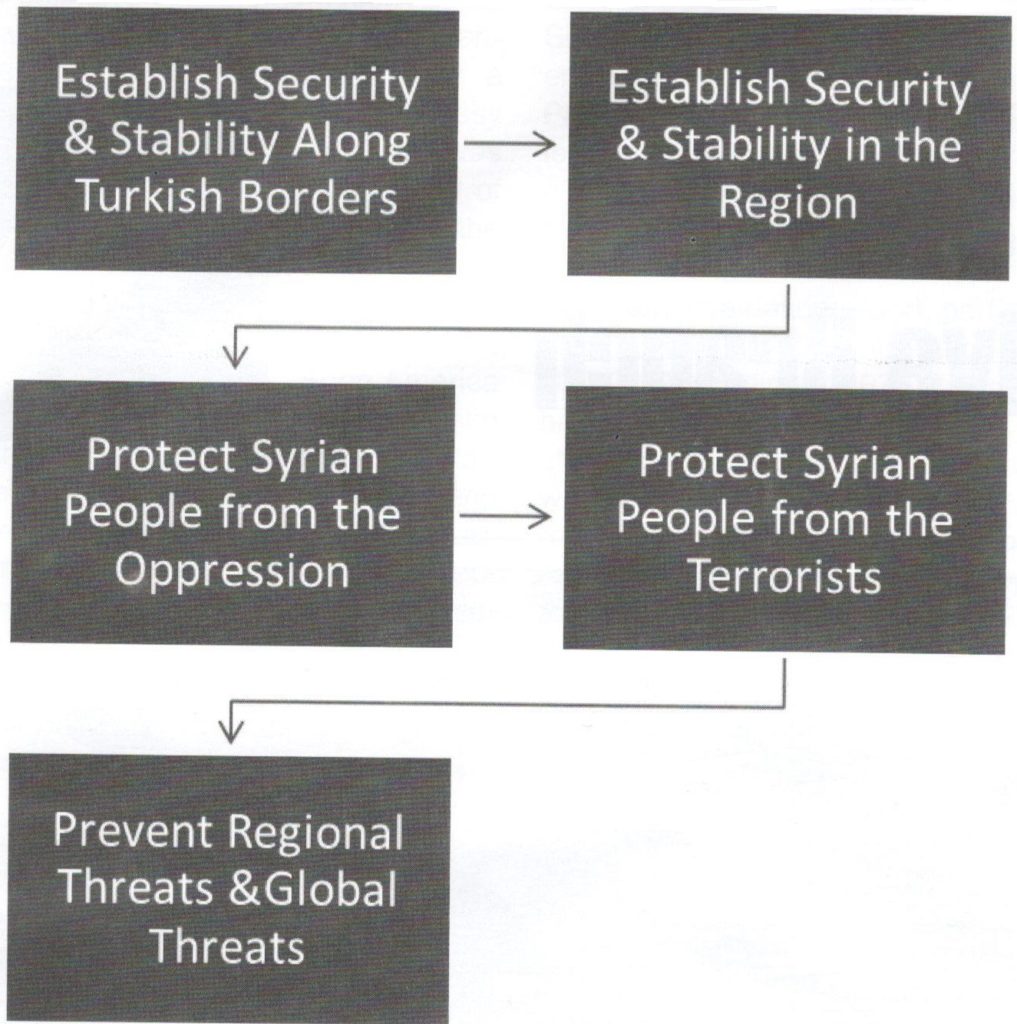
Turkish military and Free Syrian Army (FSA) have now successfully liberated two more villages in northwestern Syria from PKK/YPG terrorists. The villages of Hassan Kalkawi and Jalma near Raju town in Afrin have been cleared from terrorists. Since the beginning of the operation on January 20, 2018 to remove the “PKK/PYD/YPG/KCK and Daesh terrorists” from Afrin, 65 different strategic areas have been captured from the clutches of terrorists.
Strategic Aims
The above figure clearly shows that Turkey desires to establish area which is free from all kinds of terrorist groups i.e. PKK/PYD/YPG/KCK and Daesh which have been trained, funded and supported by the USA in Syria.
Main Reasons
According to the Turkish General Staff, the operation aims to establish security and stability along Turkish borders and in the region as well as to protect Syrian people from oppression and cruelty of terrorists. Turkey being an independent and sovereign state has every right to defend its national and strategic interests. The operation is being carried out under the framework of Turkey’s rights within international law, U.N. Security Council resolutions, its right to self-defense under the U.N. Charter and respect for Syria’s territorial integrity. Moreover, this military operation is being placed on not harming any “civilians”.
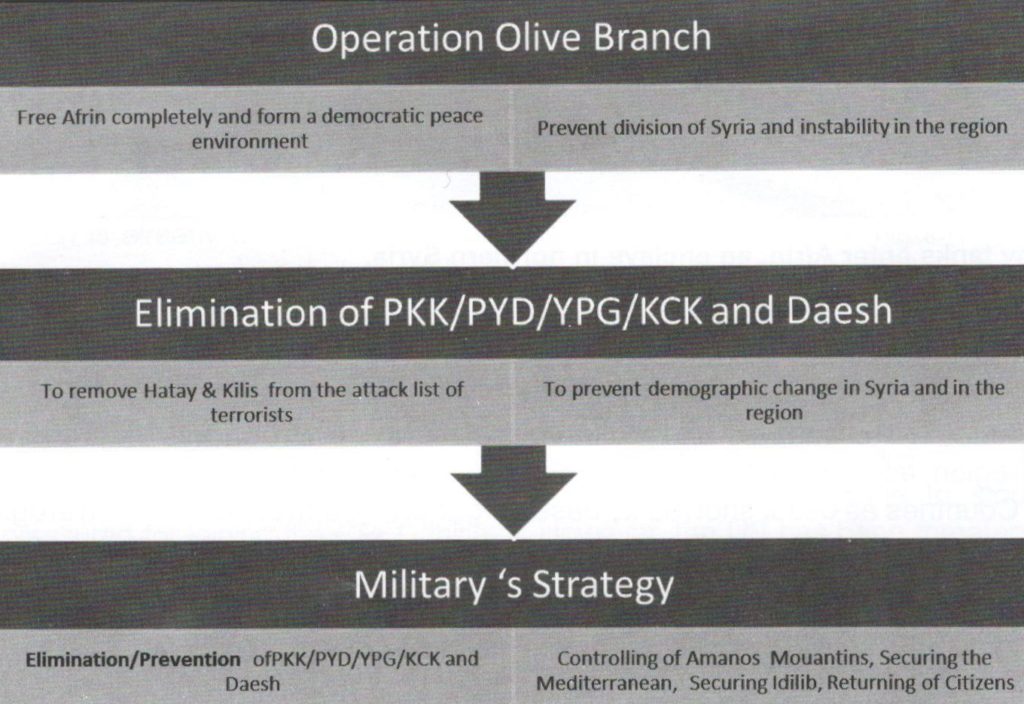
Humanitarian Aspects of Military Operation
Despite Western media propaganda and the so-called US serious security concerns, the ongoing military operation olive branch has humanitarian aspects too which are being carried out in Syrian by Turkish Forces and trying to change miseries into smiles.
The military operation in Afrin bordering Turkey’s Hatay and Kilis provinces was widely expected in the wake of Turkey’s Operation Euphrates Shield in northern Syria, which cleared Daesh terrorists from Turkey’s border between Aug. 24, 2016, and March 2017. Afrin has been a major hideout for the Democratic Unity Party (PYD) and its armed wing YPG since July 2012 when the Assad regime in Syria left the city to the terror group without putting up a fight.
The Turkish operation in Afrin will be completed by May, after which the military may look to move into Iraq, Turkish Foreign Minister Mevlut Cavusoglu announced. The PKK is a designated terrorist organisation by Turkey, the United States and the European Union. Ankara considers the YPG to be a Syrian extension of the PKK, who form the majority of the US-backed Syrian Democratic Forces (SDF). The US proposal to establish a permanent 30,000 strong force on the Turkish-Syrian border prompted launching of the military offensive “Operation Olive Branch” in the north of Syria in 2018.
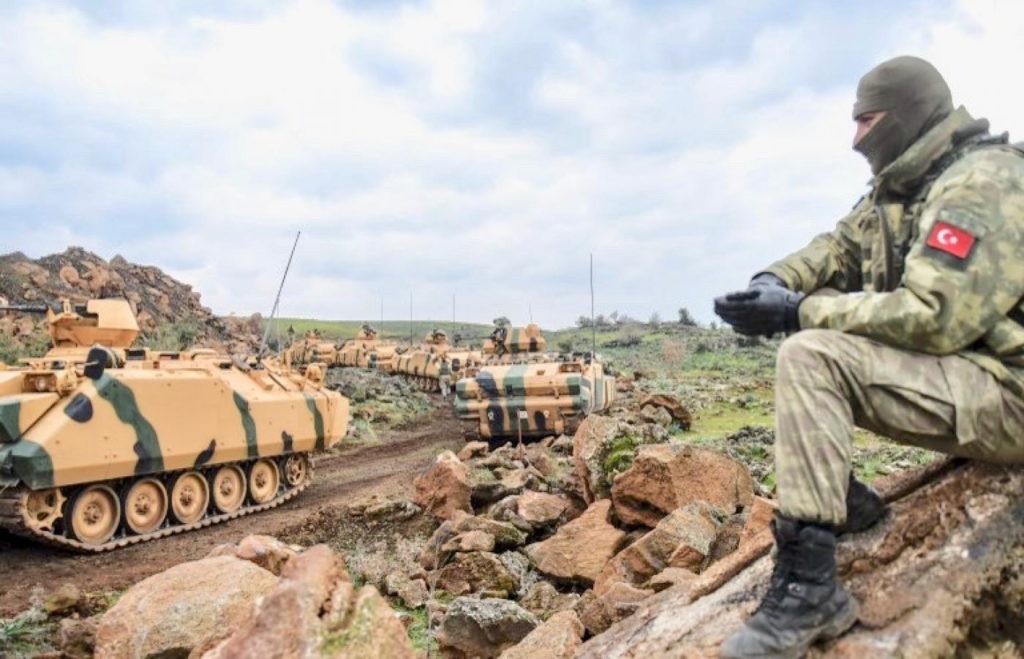
Military Mileage
According to the Turkish press so far the ongoing military operation has captured 157 strategic locations, including five town centres, 122 villages, 30 strategic areas, and one YPG base. The military operation is using air power, artillery and ground troops that has alarmed the United States which has supported the YPG, or People’s Protection Units. Turkey, which has battled a decades old insurgency in its mainly Kurdish southeast, considers the Syrian Kurdish YPG which controls Afrin, to be a terrorist group whose growing power on its southern border threatens Turkish security. Turkey is angered by the United States decision to ally itself with the YPG against Islamic State, and President Tayyip Erdogan has repeatedly said Turkey would act to crush the terror corridor of Kurdish territory stretching along much of the 900 km border of his country.
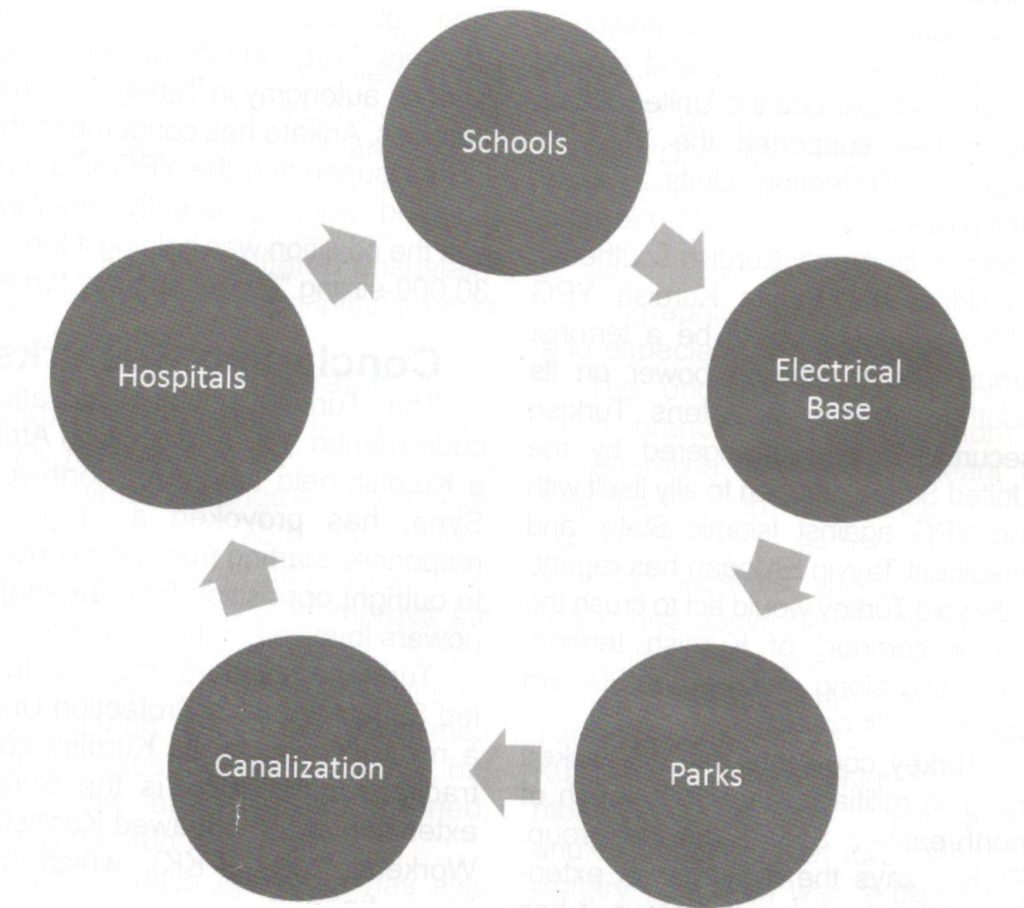
Turkey considers the US-backed Kurdish militia that controls much of north-eastern Syria a terrorist group. Turkey says the militia is an extension of a Kurdish rebel group it has fought for decades, and wants to prevent it consolidating its hold on Syrian territory. Recent US plans to help the militia form a 30,000-strong border security force has alarmed Ankara. Turkey’s president said Washington was creating a terror army and vowed to suffocate it. Turkey wants to clear Kurdish forces from Afrin where operations began on 20 January and Manbij. Turkey has vowed to crush a Syrian Kurdish militia called the People’s Protection Units (YPG), which it considers a terrorist group. Turkish President Recep Tayyip Erdogan says it is an extension of the banned Kurdistan Workers’ Party which has fought for Kurdish autonomy in Turkey for three decades. Ankara has condemned the US for supporting the YPG and was alarmed when it recently emerged that the coalition was helping it form a 30,000-strong “border security force”.
Concluding Remarks
The Turkish military operation code named “Olive Branch” in Afrin, a Kurdish-held canton of northwest Syria, has provoked a range of responses starting from tacit support to outright opposition from the major powers involved in the Syria conflict.
Turkey considers the Kurdish-led Syrian People’s Protection Units a militia known by its Kurdish contraction of the YPG is the Syrian extension of the outlawed Kurdistan Workers’ Party (PKK), which has been fighting an insurgency in Turkey for more than 30 years.
Turkey is concerned about an armed Kurdish presence building up on its southern border, and wishes to prevent any prospect of Kurdish militias linking territories they hold across northern Syria. Now Erdogan is attempting, with Operation Olive Branch, to conquer Afrin and completely destroy the much smaller and more vulnerable Syrian-Kurdish western front.
YPG, which is the armed wing of Democratic Union Party (PYD) and affiliated to the terrorist organization Kurdistan Workers’ Party (PKK) that has been in conflict with Turkey for decades, had been perceived as a grave danger for Turkey’s border security for a long while. In addition to that, there have been great concerns about the possibility of YPG’s potential access to the Mediterranean. Given these concerns, in recent years, the primary goal of Turkey’s foreign policy in Syria has been to keep the YPG’s enclave fragmented and landlocked rather than toppling Bashar Assad, the President of the Syrian regime and ongoing military operation “Olive Branch” is its strategic extension.
The YPG has increasingly become the US’s main local partner in Syria. Before the Olive Branch Operation, Turkey had already had two military operations in Syria, both of which targeted YPG: The Euphrates Shield Operation in August 2016, with which Turkey prevented the creation of territorial continuity between Syrian Kurdish cantons and Turkey’s military entry into Idlib, with which it effectively stopped the YPG’s expanding any further westward towards the sea.
Recep Tayyip Erdogan, the President of Turkish Republic, had already clearly given the signal of the third military operation into Syria which would target the YPG’s enclave in Afrin. With this recent operation, Turkey is going to aim to bring about an end to YPG’s activities which have been threatening for Turkey’s border security.
Turkey is not only going to secure its borders and also initiate a pushback strategy against the territorial gains of the PYD-YPG and obstruct their way to the Mediterranean. Moreover, the ongoing operation is also going to send a message to the Syrian Kurds that the presence of superpowers US and Russia in Syria would not be sufficient to shield them against Turkey.
The recent declaration of the US to maintain a military force in Syria and desire to create a 30,000 strong border force along with YPG proved to be the last straw for Turkey to push the button for the military intervention. Rather than trying to convince the Americans to deal with the Syrian Kurds, the situation has led Turkey to explore other options. Turkey does not have any “ethnic based target” in the ongoing military operation in Syria.
President Erdogan is determined to keep his forces on the ground until the primary goals of the operation are achieved. He clearly stated, “Turkey will not take a step back from Afrin operation”. Prime Minister Binali Yildirim also said that Afrin would be cleansed from all terrorist organizations and a 30 km-depth security zone would be established beyond the Turkish border.
Operation Olive Branch encountered considerable difficulties in the initial phases. Adverse weather conditions, especially the rain and mud, slowed down the infantry’s advance and reduced the effectiveness of air support. Furthermore, the Turks and their rebel allies faced difficult terrain such as mountains and forests during their opening push. The YPG also hindered the Turkish advance by initially adopting a forward defensive stance, sending large numbers of fighters to the border and conducting a number of spirited counterattacks, which drove back the Turks and their allies. Also, the YPG had made preparations. Long aware of Ankara’s designs on the region, the group erected numerous defensive fortifications along the frontier with Turkey in expectation of an eventual assault. Subsequently, Turkish forces succeeded to capture many strategic locations, areas, bases and mountains to secure its strategic interest.
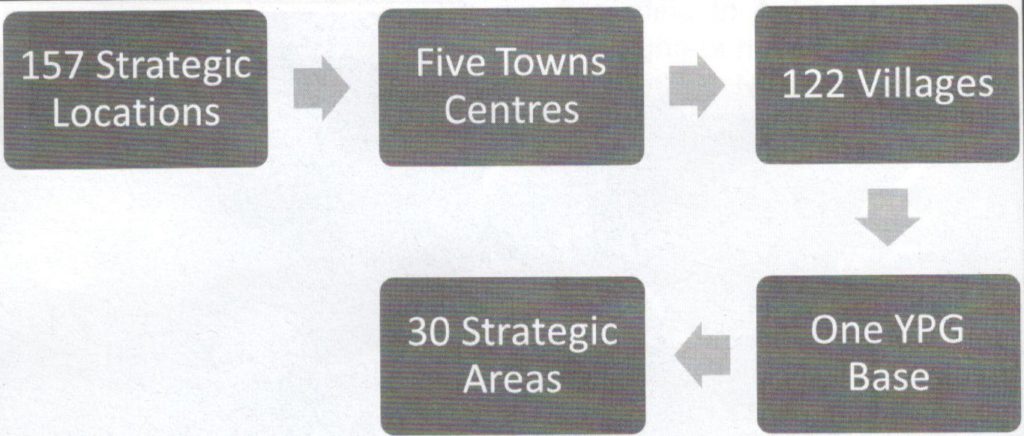
There is no match of martial power between Turkish armed forces and the YPG which is secretly receiving arms i.e. large numbers of anti-tank guided missiles from the Syrian government, Iran and elsewhere in Kurdish-controlled northern Syria at the beginning of the conflict, but such arms are insufficient to match the weaponry wielded by the Turkish Forces. As a result, the YPG has suffered unsustainable losses during the initial phases of the fighting.
As Turkey’s Operation Olive Branch has proceeded the country’s military has demonstrated its considerable strengths. Ankara has exerted considerable effort since the end of Operation Euphrates Shield in early 2017 to improve the combat capabilities of its Syrian rebel allies. Those fighters still possess glaring flaws in terms of their combat capability and discipline but they now appear better trained, equipped and led.
The Turkish Air Force has also played a critical role in the ongoing operation. Turkey’s military planners have also augmented their airstrikes with heavy artillery and rocket fire from artillery units. The YPG, a predominantly light infantry force is at a serious disadvantage against this firepower and has suffered accordingly.
Turkey has also deployed some of its most elite units for the operation, including large numbers of special operations forces which have gained experience against the Kurdistan Workers’ Party (PKK) in battles in Southeast Anatolia since 2015. The Special Forces have enhanced their effectiveness and call in airstrikes, while commanders have also deployed special commandos and mountain warfare units to spearhead some of the most difficult attacks in the mountainous region of Afrin.
The ongoing “Olive Branch” is neither an invasion of salvation nor it has ethnic orientation. It was launched to secure Turkey’s borders. It was started to prevent the US from disturbing regional power. It was initiated to curb deadly activities and ill designs of terrorists groups such as PKK/PYD/YPG/KCK and Daesh terrorists from Afrin. It was ordered to secure the further division of Syria. It was meant to stop a planned “demographic change” in the region and especially in Syria.
“Olive Branch” also has definite human consideration, it meant to help the IDPs to return back to their homes. It was planned to build schools, hospitals, parks, electricity bases and above all maintain peace and stability in Syria and in the region.
The capturing of Afrin has fulfilled Turkey’s aim of preventing the Kurdish militia from linking up its territories in eastern and western Syria, and Erdogan’s threat to expand the military operation was a bargaining chip aimed at Washington.


